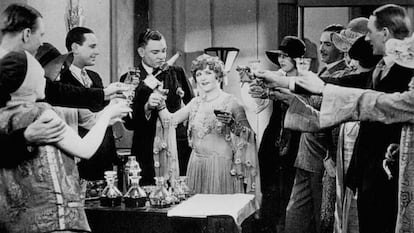Five great films for cinephiles that you’ll find hidden on Netflix
We take a dive into the streaming platform in search of cinematic treasures. On this first incursion, we discover works from sacred directors such as Vittorio de Sica and Jean-Luc Godard

Behind the image of each streaming platform, the one that the company itself wants to convey, there are hidden surprises that, at first glance, don’t fit within the perception the public has of their offerings. Many of these anomalies should be a cause for celebration, in spite of the company’s complete lack of interest in promoting them. That’s why we have proposed a search within paid streaming services, with the aim of bringing to light these hidden gems – superb works that you would never imagine finding via these channels. We begin with Netflix.
1. ‘A Run for your Money’ (1949), dir. Charles Frend.
British producer Ealing made cinematic history thanks to 17 prodigious comedies made between 1947 and 1955. Among the best known were Passport to Pimlico and The Ladykillers. Run for your Money is less well known, and follows two Welsh miners who are given a prize for digging the most coal. They get £200 and tickets to watch England play Wales in a rugby match in Twickenham. The obstacle, however, is that these two unsuspecting small-town characters are unable to hold on to either of their rewards once in the big city.
2. ‘The Boom’ (1963), dir. Vittorio de Sica.
He signs blank checks, offers unbeatable deals to his friends (having been paid in full first), and is always up to speed with a real estate bargain. Alberto Sordi takes the lead role in this movie, which, with a script by the maestro Cesare Zavattini, is a classic Italian comedy. De Sica’s direction is of particular note, especially when he exploits the key moment of the film: an opulent woman offers the protagonist the best deal possible to solve his economic woes.
3. ‘Champagne’ (1928), dir. Alfred Hitchcock.
The ninth full-length feature from Hitchcock, Champagne was one of the last silent films from the great director. It opens and closes with two spectacular shots of a glass filled with the eponymous drink, with the bubbles and the alcohol reflecting the frivolity of the lives narrated in between.
4. ‘The Angry Silence’ (1960), dir. Guy Green.
Starring Richard Attenborough, The Angry Silence examines the dichotomy between strikers and scabs from a perspective that distances itself from Manicheism. It introduces the complexity of manipulation from above, and even infiltration, and includes a number of dilemmas that still persist today. For example, the confrontation between “those who can allow themselves to strike” and those who fear for the effect it will have on their families.
5. ‘The Carabineers’ (1963), dir. Jean-Luc Godard.
An anti-war allegory, The Carabineers is pure Godard. The actions of a group of youngsters are intercut with documentary images of death and destruction. The usual texts that the French-Swiss director superimposes onto the screen complete a cinematic exercise that at all times is self-aware of its own rendering. The most transgressive film of this selection.
Tu suscripción se está usando en otro dispositivo
¿Quieres añadir otro usuario a tu suscripción?
Si continúas leyendo en este dispositivo, no se podrá leer en el otro.
FlechaTu suscripción se está usando en otro dispositivo y solo puedes acceder a EL PAÍS desde un dispositivo a la vez.
Si quieres compartir tu cuenta, cambia tu suscripción a la modalidad Premium, así podrás añadir otro usuario. Cada uno accederá con su propia cuenta de email, lo que os permitirá personalizar vuestra experiencia en EL PAÍS.
¿Tienes una suscripción de empresa? Accede aquí para contratar más cuentas.
En el caso de no saber quién está usando tu cuenta, te recomendamos cambiar tu contraseña aquí.
Si decides continuar compartiendo tu cuenta, este mensaje se mostrará en tu dispositivo y en el de la otra persona que está usando tu cuenta de forma indefinida, afectando a tu experiencia de lectura. Puedes consultar aquí los términos y condiciones de la suscripción digital.









































